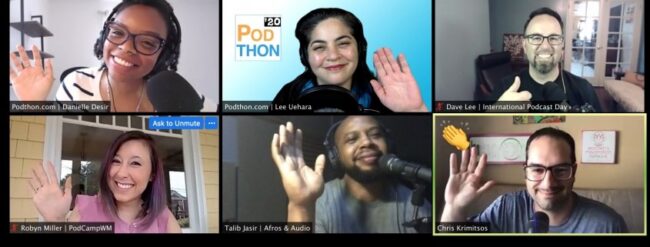
Amid the global pandemic, the demand for media content to fill our “free” time has steadily increased. There are now a multitude of streaming networks, and live video has become a staple. Just when we thought we’ve reached our media limits, podcast listening made a comeback after an early slump with the halting of regular commutes.
Ad dollars for podcasting suffered an initial COVID-19 hit, but the industry is beginning to bounce back. A new IAB and PricewaterhouseCooper’s full-year podcast ad revenue study projects advertising revenues to reach 14.7% year over year to the tune of $1 billion in 2020. This space has also seen a plethora of podcast conferences, which translates to both learning and speaking opportunities. Essentially, podcasting is big business.
While this study means opportunities for many podcasters as a whole are in abundance, such options are often absent for podcasters of color. The dearth of diverse voices at conferences is no secret – and this is precisely what podcasters Lee Uehara and Danielle Desir sought to solve by creating Podthon, a virtual conference hosted by the Women of Color (WOC) Podcasters and the Asian American Podcasters Association (AAP).
“We started Podthon because we wanted to create our own opportunity for podcasters of color to speak on stage after seeing so many speaker submission rejections from the larger industry conferences,” said Uehara, who also co-founded AAPC. “That’s our general message to everyone — go out and create your own opportunities.”
Standing out in a space that seems saturated with conferences requires innovative thinking. As such, Desir, co-founder of WOC Podcasters, says they seek speakers who provide fresh and innovative information.
“We pride ourselves on sourcing speakers who can speak to topics that are outside of the norm. This year, Norman Chella shared how to break into the Asian podcast market and Tracey Nguyen Mang shared how to find grants to fund your podcast. Both topics we have never seen discussed in the podcasting space before.”
Desir also noted that among the offerings were two keynote panels, where podcast event organizers and podcast news editors shared how to craft press releases and secure speaking gigs at larger podcast conferences. Both Desir and Uehara assert that Podthon’s virtual venue is attractive to attendees in part because it cuts down on travel and lodging costs, allowing participants and speakers to attend from any location.
At its core, Podthon acts as an incubator for podcasters of color to network and hone speaking skills.
“One of the pillars of our mission is to coach speakers, who may need a little help, so that they go on to larger stages with confidence,” said Uehara. “So, part of our vision is to continue to offer fantastic presentations from podcasters of color who then go on to become even greater speakers.”
As for Podthon’s future direction, the pair intend to expand to offerings outside of the set conference time frame.
“We’re working on other exciting things such as our monthly Round Table Series (RTS) — the next is self-publishing for podcasters” Uehara said.
It’s clear that there are barriers preventing podcasters of color from being called on to share their expertise. In the Harvard Business Review, Ruchika Tulshyan writes about challenging such exclusion by recognizing and acknowledging “the systematic barriers holding back people of color (especially) from being recognized as experts.”
Based on the impressive speaker roster, it appears that Podthon’s founders are up for the challenge.
This post was written by Dr. Chetachi A. Egwu, Communication Faculty at University of Maryland University College. Dr. Egwu’s scholarship focuses on media, tech and pop culture and the African image in film, with an emphasis on documentary. The Howard University alumna is the host of the livestreamed show MediaScope, co-host of the podcast TV Channeling and co-creator of And We’re Live. Follow her on Twitter @Tachiada.
Follow The Burton Wire on Twitter @TheBurtonWire.








